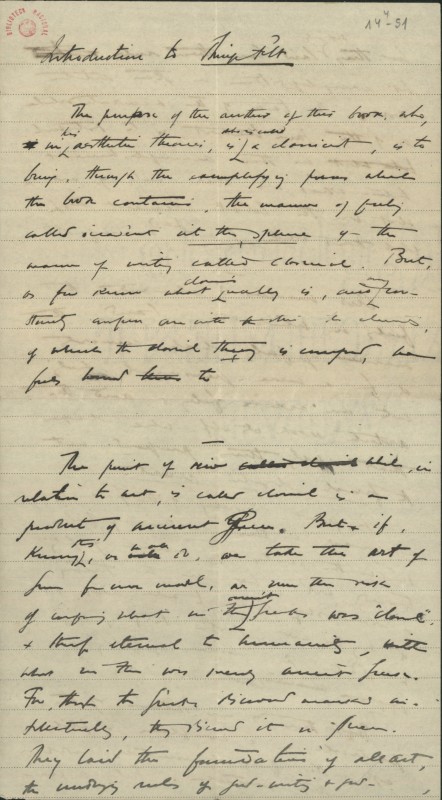Identificação
[BNP/E3, 144 – 51-52]
Introduction to Things Felt
The purpose of the author of this book, who, in his aesthetic theories, is what is called a classicist, is to being, through the exemplifying powers which the book contain, the manner of feeling called decadent |into the sphere| of the manner of writing called classical. But, as far known what classicism really is, and many constantly confuse one with other the elements, of which the classical |theory| is composed, he feels bound to {…}
_______
The point of view which, in relation to art, is called classical is a product of ancient Greece. But if, knowing this, or as other do, we take the art of Greece for our model, we are then sink to confusing what in the ancient Greeks was “classical”, as therefore eternal to humanity, with what in this was merely ancient Greece. For, though the Greeks discovered mankind intellectually, they discovered it in Greece. They laid the foundations of all art, the undying realms of good-writing and good-{…},
[51v]
but they not only laid down these realms but exemplified them as their aesthetic work. The task of the accurate scholar, as of the same theorist, is to distinguish in their accomplishment, between what was their rule of art and what was the local element thereof which that rule of art[1] manifested.
_______
Art involves 3 elements: the feeling on which it is based; the manner of feeling which converts it from a mere personal feeling into an artistic feeling; and the artistic work itself, which shapes that feeling, thus prepared, into a |formal objective result|.
The great discovery of the Greeks was but made in the realm of feeling, or even in the realm of manner of feeling towards art; but in the theory of workmanship came to all art that it may be art, whatever the feeling may be, whatever the manner of feeling may convert that feeling to. That there is no science of the particular, is a commonplace of philosophy. Now, feeling is essentially individual, and therefore particular. Feeling is in-
[52r]
communicable in its essence; it can only be demonstrated to others when it was proved through the intellect so that, finding word, which are intellectual, it may reach speech.
When we come, however, to that intellectualized feeling which proceeds experience, we {…} As the Greeks were highly intellectual, in the very substance of the temperament, they intellectualized highly when they intellectualized. Now, intelligence[2] is general and abstract – the contrary of what feeling is. So the intellectualized feeling of the Greeks is highly intellectualized: how that breadth of humanity, the departicularization of feeling that makes those works of art, as aesthetic works of feeling (except when, as in Plato, the beautiful element is already burning the Hellenic one)
[52v]
acceptable to all men in all ages. Being aesthetical, they express, as such feeling, only so much as is abstract and therefore human; {…}
[BNP/E3, 144 – 51-52]
Introdução a Things Felt
O propósito do autor deste livro, que, nas suas teorias estéticas, é o que se denomina de classicista, é ser, pelos poderes exemplificativos que o livro contém, a maneira de sentir dita decadente |para a esfera| da maneira de escrever chamada clássica. Mas, até onde se sabe o que realmente é o classicismo, e muitos confundem constantemente um elemento com o outro, dos quais a |teoria| clássica é composta, ele se sente obrigado a {…}
_______
O ponto de vista que, em relação à arte, se denomina clássico é um produto da Grécia antiga. Mas se, sabendo disso, ou como outros fazem, tomarmos a arte da Grécia como o nosso modelo, estaremos então afundados na confusão do que nos antigos gregos era “clássico”, como portanto eterno à humanidade, com o que nestes era apenas Grécia antiga. Pois, embora os gregos tenham descoberto a humanidade intelectualmente, descobriram-na na Grécia. Eles lançaram as bases de toda arte, as esferas imortais da boa escrita e do bom {…},
[51v]
mas eles não apenas estabeleceram essas esferas, mas exemplificaram-nas com o seu trabalho estético. A tarefa do estudioso preciso, como a do mesmo teórico, é distinguir na sua realização, entre o que era a sua regra de arte e qual era o elemento local dela que essa regra de arte manifestava.
_______
A arte envolve 3 elementos: o sentimento em que se baseia; a maneira de sentir que o converte de mero sentimento pessoal em sentimento artístico; e o próprio trabalho artístico, que dá forma a esse sentimento, assim elaborado, num |resultado objectivo formal|.
A grande descoberta dos gregos foi feita na esfera do sentimento, ou mesmo na esfera da maneira de sentir em relação à arte; mas na teoria da obra toda arte para que pudesse ser arte, qualquer que seja o sentimento, qualquer que seja a maneira de sentir que pode converter esse sentimento. Que não há ciência do particular é um lugar-comum da filosofia. Agora, o sentimento é essencialmente individual e, portanto, particular. O sentimento é in-
[52r]
comunicável na sua essência; só pode ser demonstrado a outros quando for provado pelo intelecto para que, encontrando a palavra, que é intelectual, possa alcançar a fala.
Quando chegamos, contudo, àquele sentimento intelectualizado que procede a experiência, nós {…} Como os gregos eram altamente intelectuais, na própria substância do temperamento, eles intelectualizaram muito quando intelectualizaram. Ora, a inteligência é geral e abstracta - ao contrário do que é o sentimento. Assim, o sentimento intelectualizado dos gregos é altamente intelectualizado: como essa amplitude de humanidade, a departicularização do sentimento que torna essas obras de arte, como obras de sentimento estéticas (excepto quando, como em Platão, o elemento do belo já está queimando o helénico)
[52v]
aceitável para todos os homens em todas as idades. Sendo estéticos, eles expressam, como tal sentimento, apenas tanto quanto é abstracto e, portanto, humano; {…}
[1] art /[was]\
[2] intelligence/ct\



